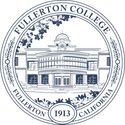Office: North Science – 627–04
Phone: (714) 992-7410
Email: psjoberg@fullcoll.edu
Web Page: staff.fullcoll.edu/psjoberg
Required Materials:
Text: James Stewart, Calculus: Early Transcendentals, Eighth Edition, published by CENGAGE Learning, ISBN-13: 978-1285741550
Paper: All graded work must be done on 8.5 x 11 in. or letter size paper. Points will be deducted for work done on other sizes or spiral notebook paper.
Course Description
This is a second semester course covering applications of growth and decay, applications of integration, integration techniques, improper integrals, sequences and series, parametric equations, and polar coordinates.Prerequisite
MATH 151 Calculus I or equivalent, with a grade of C or better.Student Learning Outcomes
1) Determine various geometric measurements including area of a region between curves, volume of a solid, arc length of a curve, or area of a surface of revolution by constructing and calculating a definite integral. 2) Analyze an integral to determine an appropriate method of integration, and apply that method to determine the antiderivative. 3) Analyze an infinite series to determine an appropriate test for convergence, and apply that test to determine whether the series converges or diverges.What to Expect
This course is a continuation of the first semester of Calculus. You will be expected to use material learned in the first semester as if it were covered in this course. The better your skills are in limits, differentiation and integration, the easier you will find comprehending the material in this course. If you are rusty in those areas, it will be your responsibility to review. As with every new math course, homework is an important part of the learning process. The homework is supposed to be challenging and you are expected to struggle. Do not use the student solutions manual to circumvent this process. If a student puts considerable amount of effort into this class but does not pass, it is usually due to reliance on the solutions manual. Plan on spending at least 4 hours per week on out-of-class studying. Setting a regular schedule can be very effective.Contacting Me
The best way to contact me outside of office hours is by using email. My office hours are Monday, 9:25-10:25 AM, Tuesday 9:30-11:30 AM, Wednesday 9:25-10:25 AM and Thursday 9:30-11:00 AM.Homework
I will assign and collect homework daily. Please read my homework guide on my website. Late homework will NOT be accepted. Your homework must be neat and organized, showing the original problem and all of the necessary work. Your final answer should be circled, boxed or highlighted. Disorganized and/or messy assignments with misleading information or correct answers that “magically” appear from incorrect work will receive no credit. Each section will be graded on a 5-point scale based on completeness. I encourage you to discuss the homework with classmates, however you will be on your own during exams and quizzes, and the homework is designed to be preparation for these situations.Quizzes
Quizzes consisting of problems from the homework will be given periodically. There will be NO make-ups. If you are not in class during the time we take the quiz, you will receive a zero on the quiz and you will not be able to make it up. Please try to make it to class on time.Exams
There will be 4 exams during the semester and one comprehensive final exam. Tests must be taken on the designated date. Make-up tests will not be given. In the event that it will help your grade, you may replace your lowest test score* with your score on the final exam.Grades
Your semester grade will be determined using the following scale, rounded to the nearest percent. A: 90 – 100%, B: 80 – 89%, C: 70 – 79%, D: 60 – 69%, F: Less than 60%.If your adjusted test average (your test average after replacing your lowest test score with your score on the final exam) is less than 70% at the end of the semester, your grade will be the minimum of your adjusted test average and your grade calculated using the weights below. In other words, to earn a C grade or higher, you must finish with a test average of a C or higher.
If your adjusted test average is 70% or greater, your grade will be determined using the following scale:
| Homework | 10% |
| Exams | 67% |
| Final Exam | 20% |
| Quizzes | 3% |
Calculators
A graphing calculator is recommended. The TI-84 graphing calculator is a good choice since this is the calculator I will be using during in-class demonstrations. A calculator may be permitted for use on some quizzes and tests. If you do not have a calculator at the time of the quiz/test, you may NOT share one with a classmate. TI-89 or above (or equivalent model) will not be allowed. You may not use your mobile phone calculator on quizzes or tests.Student Honesty Policy
Cheating at the college level is a very serious offense. If I observe you cheating on any test or quiz, after the first incident you will receive a zero and a warning. If there is a second incident, you will receive another zero and the college administration will be contacted. A zero score on an exam that is the result of cheating will not be replaced by the final exam score.Attendance
Attendance will be taken each class meeting. If you are absent for three days during the semester and you do not contact me, you will be dropped from the course.Fullerton College Policies
The Fullerton College Catalog and the Class Schedule contain a number of policies relating to students that are important to you. Please be sure that you have read these publications thoroughly. You may purchase copies of these publications at the campus bookstore, or you may read them online at the Fullerton College website, www.fullcoll.edu.*If you receive a zero on an exam for cheating, you may not replace that score with your score on the final exam
